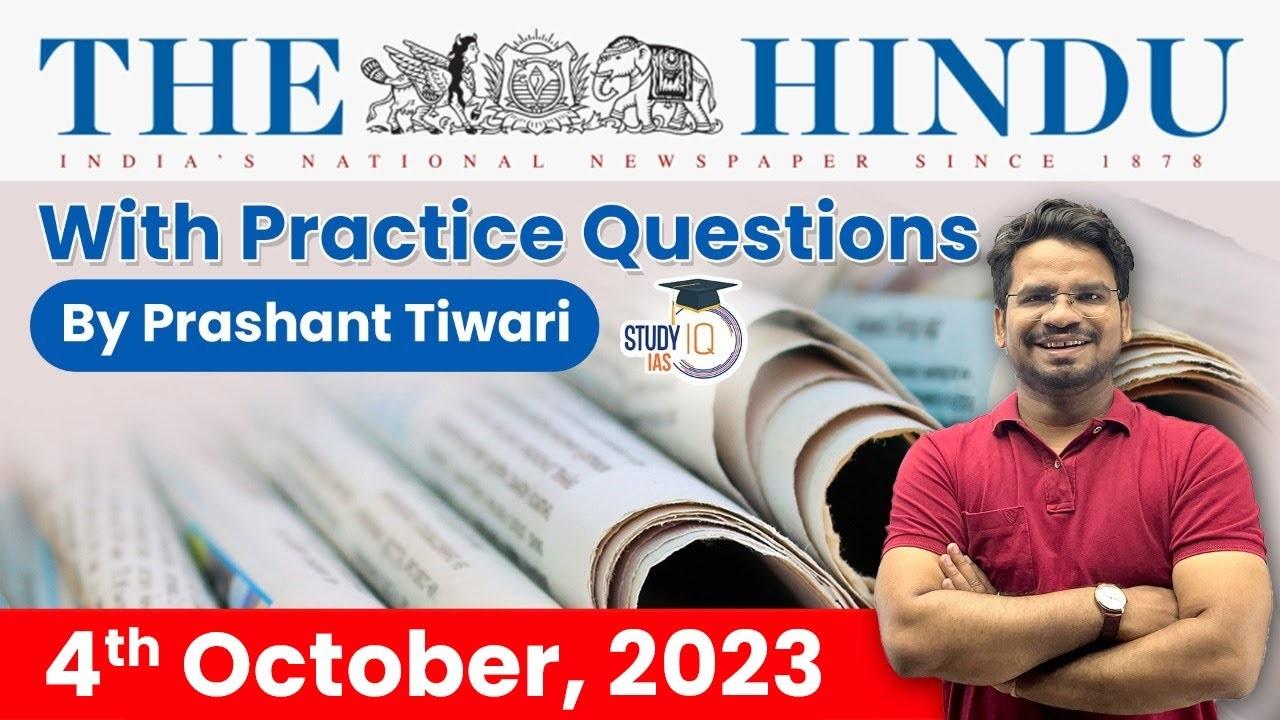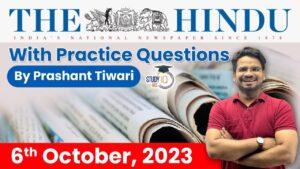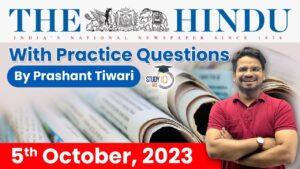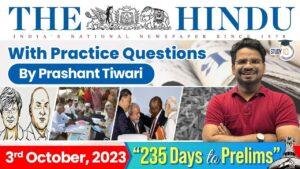The Hindu Newspaper Analysis for UPSC
- The Delhi police on Tuesday arrested Prabir Purkayastha, founder and Editor-in-Chief of news portal NewsClick and its Human Resources head Amit Chakraborty in an alleged terror case.
- Deputy Commissioner of Police (PRO) Suman Nalwa said that a total of 46 “suspects”, including nine women, were questioned and their phones, laptops and devices seized for further examination. She added that proceedings were on and two persons had been arrested thus far.
- Police raided the homes and offices of journalists, authors, academics, contributors and a satirist associated with the news portal in a terrorism case. The journalists were asked questions about the Delhi communal riots and the CAA agitation of 2019-20, the farmers protest of 2020-21 and whether they used encrypted messaging applications such as Signal on their phones.
- The Special Cell of the Delhi police had registered a first information report (FIR) in the case on August 17 under Sections 13, 16, 17, 18 and 22 of the anti-terror Unlawful Activities (Prevention) Act and Sections 153A and 120B of the Indian Penal Code (IPC) for promoting religious enmity between groups and criminal conspiracy, respectively.
- About Unlawful Activities Prevention Act (UAPA):
- The UAPA was enacted in 1967.
- It lays down the definitions and rules for designating an organization as an “unlawful association” if it is engaged in certain types of activities.
- ‘Unlawful activity’ is defined as any action taken by an individual or association – through an act, words, spoken or written, or by signs or visible representation – which is intended to, or supports a claim to, bring about the cession of a part of the territory of India, or the secession of a part of the territory of India from the Union, or which incites any individual or group of individuals to bring about such cession or secession.
- It covers activities which disclaim, question, disrupt or are intended to disrupt the sovereignty and territorial integrity of India, and which cause or intend to cause disaffection against India.
- In 2004, the UAPA was amended, and ‘terrorist activities’ were brought within its fold, under which 34 outfits, including the Lashkar-e-Taiba and the Jaish-e-Mohammad, were banned.
- Under the Act, the central government may designate an organization as a terrorist organization if it:
- commits or participates in acts of terrorism;
- prepares for terrorism;
- promotes terrorism;
- is otherwise involved in terrorism;
- The 2019 Amendment gave the Home Ministry the power to designate individuals as terrorists.
- The Act extends to the whole of India.
- It also applies to citizens of India who are abroad, persons in service of the Indian government, and persons on ships and aircraft registered in India.
The Hindu Newspaper Analysis 3 October 2023
- Much of the knowledge that underpins most new drugs and vaccines is unearthed at the expense of governments and public funds.
- This part of drug development is more risky and protracted, when scientists identify potential biomolecular targets within the body on which a drug could act in order to manage a particular disease, followed by identifying suitable chemical candidates.
- The cost and time estimates of this phase are $1billion-$2.5 billion and several decades, respectively.
- Companies subsequently commoditise and commercialise these entities, raking in millions in profits, typically at the expense of the same people whose taxes funded the fundamental research.
- we cannot deny the ‘double-spend’ it imposes on consumers — including governments — and the profit-seeking attitude it engenders among the companies developing and manufacturing the product.
- The technology could have benefited everyone during the pandemic, but it did not. So, history should remember what actually happened during the pandemic and what the 2023 Medicine Nobel claims happened differently.
- The Comptroller and Auditor General of India (CAG), Girish Chandra Murmu, who is the chair for the Supreme Audit Institutions (SAIs) of the G20, warned that absolute dependence on Artificial Intelligence (AI) for auditing purposes may lead to inaccurate findings, and emphasised ethics as the cornerstone of responsible AI.
- Responsible AI must be ethical and inclusive. Only ethical AI can add credibility, trust, and scalability to the CAG audit. Data sets must be complete, gathered on time, accurate, available, and relevant. If integrity of the data fields is not ensured, we will have inaccurate audit findings.
- In June, the European Parliament approved the EU AI Act, the first of its kind in the world.
- The Constitution of India (Article 148) provides for an independent office of the Comptroller and Auditor General of India (CAG).
- He is the head of the Indian Audit and Accounts Department and is one of the bulwarks of the democratic system of government in India
- He is the guardian of the public purse and controls the entire financial system of the country at both the levels–the Centre and the state.
- His duty is to uphold the Constitution of India and laws of Parliament in the field of financial administration.
- Appointment, Term & Removal
- The CAG is appointed by the President of India by a warrant under his hand and seal.
- The CAG holds office for a period of six years or up to the age of 65years, whichever is earlier.
- He can resign any time from his office by addressing the resignation letter to the president.
- He can also be removed by the president on same grounds and in the same manner as a judge of the Supreme Court. In other words, he can be removed by the president on the basis of a resolution passed to that effect by both the Houses of Parliament with special majority, either on the ground of proved misbehaviour or incapacity.
- A departmental working paper by the World Bank on the progress of the Swacch Bharat Mission-Gramin (SBM-G) has now found that despite “breathtaking” gains made by the programme to bring toilet access to rural India since 2014-15, when it began, there has been a clear trend of regular toilet use declining in rural India from 2018-19, with the largest drop being seen among Scheduled Caste and Scheduled Tribe socio-economic groups.
- These findings come amid concerns over the government’s claims that practices such as open defecation and manual scavenging no longer continue in India solely based on the fact that toilet access had improved after the building of over 100 million toilets.
- The paper, by researchers at the World Bank and a faculty member of economics at Yale University, reconciles varied data points on toilet access and usage from the National Family Health Surveys (NFHS), National Sample Surveys (NSS) and National Annual Rural Sanitation Survey (NARSS) and the SBM-G’s own information system.
- The paper also said that most low-income States were among the best performers in terms of their overall increase in regular use of toilets and that the performance of richer States was mixed.
- The President-elect of the Maldives said he will stick to his campaign promise to remove Indian military personnel stationed in the archipelago state, promising he would initiate the process.
- Muizzu’s main campaign theme was about an alleged threat to the Maldives’ sovereignty by some Indian military personnel on an island, part of the party’s years-long “India out” strategy.
- Outgoing President Ibrahim Mohamed Solih, who was elected President in 2018, was battling allegations by Mr. Muizzu that he had allowed India an unchecked presence in the country. Mr. Muizzu’s party, the People’s National Congress, is viewed as heavily pro-China.
- Circular migration is a repetitive form of migration wherein people move to another place (the destination country) and back (country of origin) according to the availability of employment.
- This effectively means that instead of migrating permanently or temporarily (moving for a period of time to complete any contract-based labour) to another location, people move to different locations for a brief period of time when work is available. It is a phenomenon mostly among low-income groups who migrate to avail of seasonally available jobs in another country, city, place etc.
- circular migration is now seen as the best way forward, as needs of development and individual economic advancement can be balanced out.
- Circular migration aims to quell all these fears. The negative effects of brain drain will reduce and a sort of brain circulation will be encouraged, wherein the individual can use his talents in both countries and still contribute to remittances.
- In India, internal migration, which is migration within a particular country or State, has almost always been circular. With the advent of jobs in the manufacturing, construction and services sector, there has been a huge flow of migrants from rural areas to urban cities.
- Between 2004–2005 and 2011–2012, the construction sector witnessed one of the largest net increases in employment for all workers, specifically for rural males.
- his has led to rural populations and their economy dwindling and urban spaces, while booming, witnessing infrastructural collapse as they are unable to properly house incoming populations.


 The Hindu Newspaper Analysis 6 October 2...
The Hindu Newspaper Analysis 6 October 2...
 The Hindu Newspaper Analysis 5 October 2...
The Hindu Newspaper Analysis 5 October 2...
 The Hindu Newspaper Analysis 3 October 2...
The Hindu Newspaper Analysis 3 October 2...

















